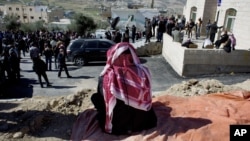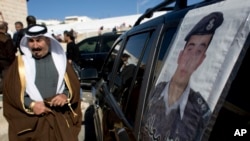Muslim clerics widely condemned the burning to death of a Jordanian pilot by the Islamic State (IS) group, saying such a form of killing is considered despicable by Islam, no matter the context.
IS militants released a video on Tuesday appearing to show captured pilot, Muath al-Kaseasbeh, being burnt alive in a cage. Jordan, which has participated in a U.S.-led military campaign to bomb Islamic State positions, responded overnight by executing two al-Qaida convicts on death row.
Kaseasbeh's gruesome execution appears to be galvanizing Arab public opinion against the group. As Jordanians mourned the pilot in mosques across the country Wednesday, crowds chanted slogans against the Islamic State group as public figures demanded revenge.
Egypt's top Muslim authority, the 1,000 year old Al-Azhar University revered by Sunni Muslims around the world, issued a statement expressing "deep anger over the lowly terrorist act" by what it called a "Satanic, terrorist" group.
The Grand Sheikh of Al-Azhar, Ahmed al-Tayeb, said the killers themselves deserved to be "killed, crucified or to have their limbs amputated."
Saudi cleric Salman al-Odah wrote on his Twitter account: "Burning is an abominable crime rejected by Islamic law regardless of its causes. It is rejected whether it falls on an individual or a group or a people. Only God tortures by fire," he added.
Official condemnations of the slaying poured in from across the Arab world, with Egypt's venerable Al Azhar University branding the militants “a source of filth and corruption on earth,” while Arab League chief Nabil ElArabi called the brutal killing a “heinous crime.” Political leaders in Iraq, the United Arab Emirates, Egypt and Lebanon also denounced the killing.
Safi al-Kaseasbeh, father of the deceased pilot, told a group gathered to offer condolences that Wednesday's retaliatory execution of two Islamic militants, Sajida Rishawi and Ziad Karboli, is not enough, and that the Jordanian government must exact a heavy price for the grisly execution that, he said, sullies the true nature of Islam.
In Kaseasbeh's home town of Karak, a neighbor condemned the killing "a crime [that] is unacceptable in Islam."
"May God bless and keep [Kaseasbeh]," he added.
Nevertheless, American University of Beirut political scientist Hilal Khashan pointed out the terrorists cited a verse in the Koran in killing Kaseasbeh.
“They justified their action on the basis that the Coalition's air attacks killed many innocent civilians and they displayed some gruesome images about the outcome of such air raids, including the burning of people alive," he said. "In Islam, in the Sourah Al Baqara, in Sourah number two, verse 194, it says 'if one transgresses against you, you may respond likewise.'”
The Islamic State posted a religious edict on Twitter, which ruled that it is permissible in Islam to burn an infidel to death.
Even clerics sympathetic to the jihadist cause said the act of burning a man alive and filming the killing would damage Islamic State, an al-Qaida offshoot which controls wide territory in Syria and Iraq, and is also known as ISIL or ISIS.
"This weakens the popularity of Islamic State because we look at Islam as a religion of mercy and tolerance. Even in the heat of battle, a prisoner of war is given good treatment," said Abu Sayaf, a Jordanian Salafist cleric also known as Mohamed al-Shalabi who spent almost ten years in Jordanian prisons for militant activity including a plot to attack U.S. troops.
"Even if the Islamic State says Muath had bombed, and burnt and killed us and we punished him in the way he did to us, we say, OK but why film the video in this shocking way?" he told Reuters. "This method has turned society against them."
SITE, a U.S.-based monitoring service, quoted Abdullah bin Muhammad al-Muhaysini, whom it described as a Saudi jihadi, as saying on Twitter it would have been better if Kasaesbeh's captors had swapped him for "Muslim captives." His killing would make ordinary people sympathetic to Kasaesbeh, he said.
Still, some admirers of Islamic State cheered the killing. In a Twitter message, a user called Suhaib said: "To any pilot participating in the crusader coalition against the holy warriors — know that your plane might fall in the next mission. Sleep well!"
The killing was denounced in the Arab press. The pan-Arab al-Hayat newspaper published the report on its front page under the headline "Barbarity."
Saudi Arabia's Arabic daily al-Riyadh newspaper wrote that the Islamic state had "deepened its savagery and its bloody approach" by burning Kasaesbeh.
EU chides Amman over executions
The European Union on Wednesday combined a statement of solidarity with Jordan over the killing of one of its military pilots by Islamist fighters with criticism of its immediate execution of two Iraqi jihadists.
"While all efforts must be made to counter terrorism and hold the perpetrators accountable, our reaction to the threat posed by [IS] needs to be consistent with our common values on justice and the rights of prisoners," foreign policy chief Federica Mogherini said in a statement.
"Our action has to be guided by the respect of international human rights law and humanitarian law. The European position against death penalty remains unchanged and we believe capital punishment does not serve any deterrent purpose."
Condemning the killing of captured F-16 pilot Muath al-Kaseasbeh, she praised Jordan's role in the "front line in the battle" against IS and taking in refugees from Syria and Iraq.
VOA's Edward Yeranian contributed reporting from Cairo.






